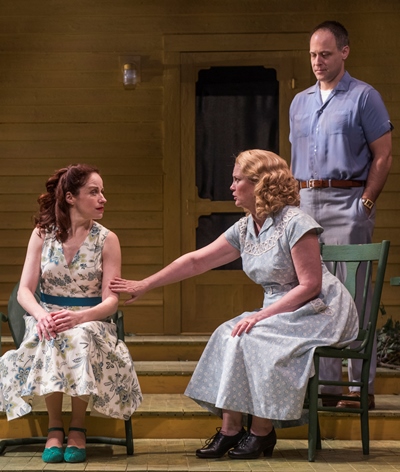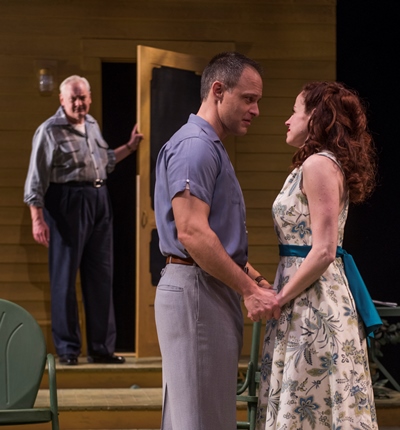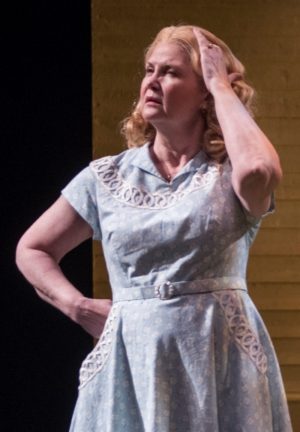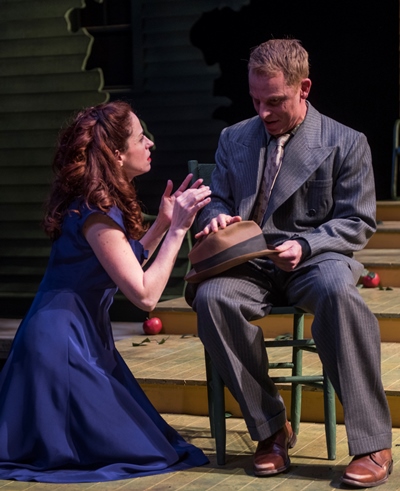‘All My Sons’ at Court: The sins of a father, unatoned and brought down on two houses
“All My Sons” by Arthur Miller, at Court Theatre, extended through Feb. 18. ★★★★★
By Lawrence B. Johnson
It’s as Greek as Aeschylus, the inexorable tragedy that infects and ultimately destroys two families in Arthur Miller’s “All My Sons.” And in the marvelous, shattering production at Court Theatre directed by Charles Newell, a long Greek shadow falls across Miller’s characters, amid the torment and self-deception, in spectral silence.
 “All My Sons,” written in 1947, is a modern slant on that ancient affront to the gods: hubris. It is about moral expediency, calamity and the sins of a father visited upon his sons.
“All My Sons,” written in 1947, is a modern slant on that ancient affront to the gods: hubris. It is about moral expediency, calamity and the sins of a father visited upon his sons.
The time is 1946, just a year after the war in the Pacific has ended, finally bringing worldwide peace after worldwide horror. But quiet has not come to Joe Keller’s home. One of their two sons, Larry, a fighter pilot, did not come back from the war. Joe’s wife Kate won’t give up hope, though. Other young men, missing longer than Larry, have returned to embrace their mothers again.
Kate resists all argument against her dogged confidence, and she chafes at new signs that her surviving son, Chris, is planning to marry Larry’s bereft sweetheart Annie. This development is doubly troublesome because Annie, who suddenly has journeyed back to visit the Kellers, is the daughter of Joe’s former partner – now in prison for selling the government defective airplane engines that caused the death of at least 20 fighter pilots.
 Joe was implicated, too, but eventually exonerated. Seems there was a frantic telephone conversation at the time between Annie’s dad, who was minding the production plant, and Joe, who was at home, ill. So it was entirely the partner’s decision to ship out the cracked engine blocks. Joe still feels awful about it, but what could he do? He explained all that to the jury.
Joe was implicated, too, but eventually exonerated. Seems there was a frantic telephone conversation at the time between Annie’s dad, who was minding the production plant, and Joe, who was at home, ill. So it was entirely the partner’s decision to ship out the cracked engine blocks. Joe still feels awful about it, but what could he do? He explained all that to the jury.
Newell’s deft work-through of Miller’s steadily grinding narrative is irresistible. Minute by minute, Joe’s stark reality, the dissolution of his big lie, grows more difficult to watch; but you can’t look away, as both his own family and Annie’s are shredded by the harsh winds of truth.
John Judd offers an expansive, likable old Joe, a man with practical sense and genuine empathy for his wife’s sad hope for their missing son. But the business about the faulty airplane engines hangs over his head – though it’s a thing not actually discussed, not even mentioned by name. Like it never happened.
 As the anxious, relentlessly hopeful mother, and share-holder in Joe’s secret, Kate Collins is heart-breaking. In this good wife and grieving mother resides the conscience of the man; she is his prop, and the weight of misdeed is growing too great for her to bear. The thought that her son, a flier, might not have perished affords her more than hope: It is her solace, a token of the gods’ forgiveness for man and wife alike.
As the anxious, relentlessly hopeful mother, and share-holder in Joe’s secret, Kate Collins is heart-breaking. In this good wife and grieving mother resides the conscience of the man; she is his prop, and the weight of misdeed is growing too great for her to bear. The thought that her son, a flier, might not have perished affords her more than hope: It is her solace, a token of the gods’ forgiveness for man and wife alike.
But the pivotal character, the one whose darting emotions lead us through this traumatic maze, is Joe and Kate’s son Chris, embodied here with nuanced energy by Timothy Edward Kane. It’s Chris who invited Annie in for the weekend. They’ve been corresponding at a distance for some time, each waiting for the other to own what is in both of their hearts. That time has come.
Kane’s portrait of Chris is done in fine brush strokes: an imperfect good guy, seen as a straight shooter, eager – or more accurately, desperate – to rise above the dark cloud that hangs over this family. The manufacturing business will come to him, but he doesn’t want his name on it.
Caught square in the middle is Annie, radiantly infectious in the form of Heidi Kettenring. Like her brother George, Annie long ago turned her back on their father. Never visited him in prison. Views him as a pariah, a traitor, worse than evil. All those boys killed because of him.
 For Annie, the picture couldn’t be clearer. She will marry Chris, and they will put all this behind them. And then brother George shows up, fresh from an enlightening visit with his father in prison. George (drawn with precise sorrow, anger and vulnerability by Dan Waller) is a lawyer who has come to confront Joe about what really happened with those engines. But he and Annie grew up next door to the Kellers, and it isn’t long before Kate has jollied him from his purpose. Until she missteps, and the earth begins to shift beneath both their houses.
For Annie, the picture couldn’t be clearer. She will marry Chris, and they will put all this behind them. And then brother George shows up, fresh from an enlightening visit with his father in prison. George (drawn with precise sorrow, anger and vulnerability by Dan Waller) is a lawyer who has come to confront Joe about what really happened with those engines. But he and Annie grew up next door to the Kellers, and it isn’t long before Kate has jollied him from his purpose. Until she missteps, and the earth begins to shift beneath both their houses.
As in any Greek tragedy, the denouement of “All My Sons” crashes down with withering force, all-consuming and inescapable. Silent witnesses to it all, even to the end, are the Kellers’ neighbors on both sides. (Designer John Culbert’s backyard set bolsters the play’s ringing honesty.) Just regular folks in ordinary America, the neighbors make speaking sallies into the story frame; but they also materialize only to stand and gaze, impassively, blankly. They know. They’ve always known.
Related Link:
- Performance location, dates and times: Details at TheatreInChicago.com
Tags: Arthur Miller, Charles Newell, Court Theatre, Dan Waller, Heidi Kettenring, John Judd, Kate Collins, Timothy Edward Kane


